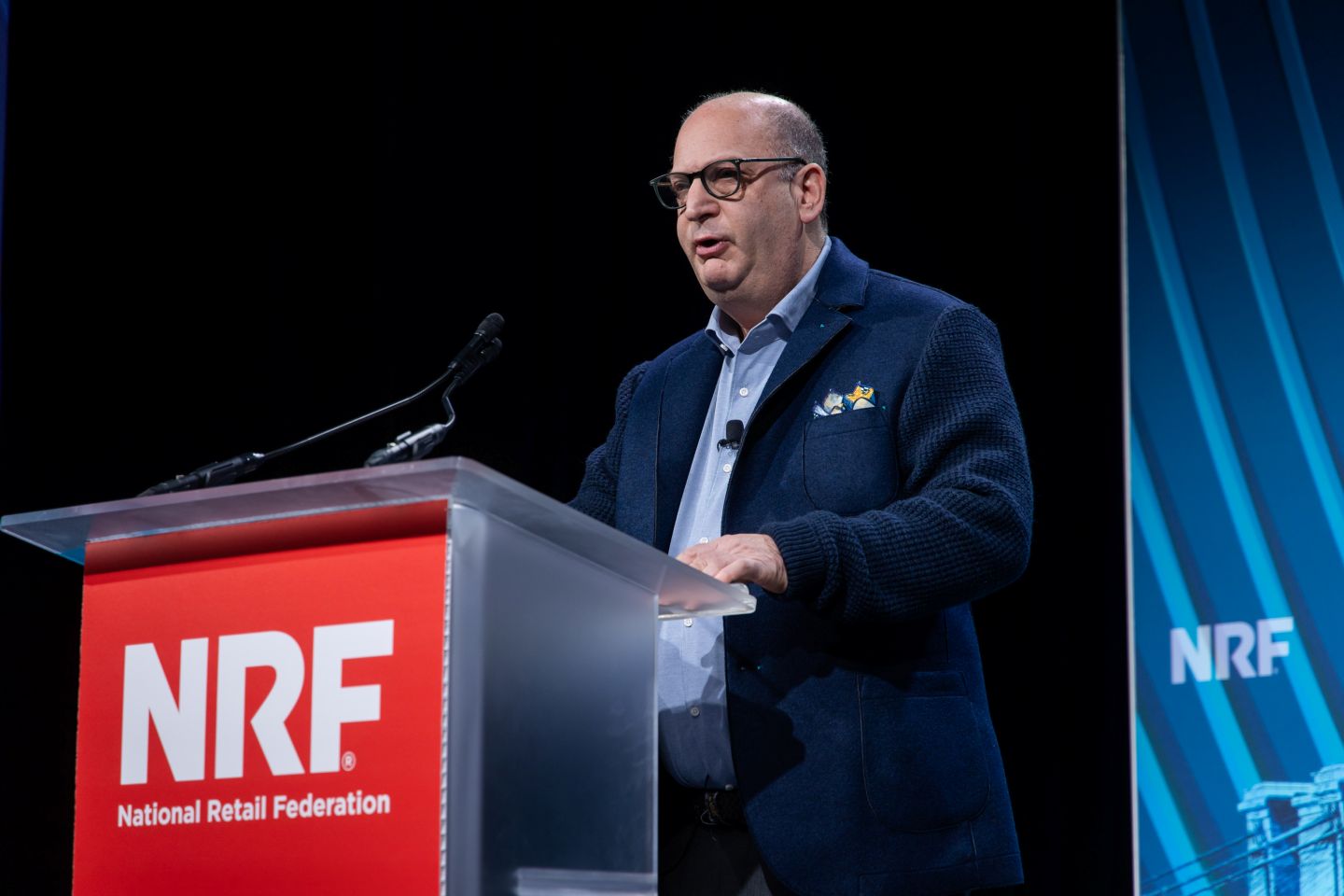
Albertsons Companies Chief Sustainability and Transformation Officer Suzanne Long speaks with Schwarz Digital GmbH & Co. KG SVP of Innovation Mirko Saul, Pacsun Chief Digital and Information Officer Shirley Gao and Vendors in Partnership CEO Vicki Cantrell at NRF 2025.
What do plate glass, electric lighting, elevators and barcodes have in common?
Each of those technological breakthroughs were used first by retailers to deliver to their customers a better experience and to achieve much more as a business, David Roth, CEO of The Store – WPP and chairman of BAV, said at NRF 2025: Retail’s Big Show.
Retailers have always been early adopters of innovation. Now the industry is welcoming another technological innovation, one that is fundamentally revolutionary, according to Roth.
“Artificial intelligence is the latest in a long line of innovations, but unlike anything we’ve seen before,” he said. “For the first time, a single technological leap has the potential to completely rewrite retailing and, more importantly, the P-and-L ratios which have remained largely unchanged since God was a boy.”

David Roth, CEO of The Store – WPP and chairman of BAV speaks at NRF 2025.
AI in retailing is not just about efficiencies or automation, but the ability to create a very new kind of retail experience for both customers and retail employees. “AI is not just a tool. It’s a force multiplier,” he said. “It’s a technology that, when applied, absolutely, holistically, can transform every single aspect of a retailer’s operation — from product selection, merchandising, supply chain management, customer service, returns and marketing.”
For Albertson Companies, the second-largest retailer in the United States, AI has been a real game changer in training its 275,000 frontline associates, according to Albertson’s Chief Sustainability and Transformation Officer Suzanne Long. The industry overall has an annual turnover rate of 60%-70%, which means hiring and training a staggering number of people every year.
“When you need to train somebody — instead of using your best associates’ time to train a new associate — there's actually an opportunity for AI to be telling them what they need to know to be effective in their job and doing that in real time,” Long said.
Similarly, Lidl, a grocery chain with 13,000 locations throughout Europe and the U.S., uses AI to translate and summarize employee training materials and handbooks into different languages.
“In retail, you have a lot of information for your employees, and honestly, it’s getting more and more, and obviously no one wants to spend hours reading this information on these pages,” said Mirko Saul, senior vice president of innovation with Lidl parent company Schwarz Digital GmbH & Co. KG. “That’s why the real-time aspect is very important.”
Particularly in its call centers, Saul said the company wants to ensure efficiency and that its best employees are available to answer more sophisticated or nuanced customer questions. Lidl uses AI to automate answers to basic questions about store hours or current promotions.
Pacsun is well versed in using AI to reach customers where they want to shop, especially online. But the retailer faces challenges ensuring its 6,000-plus front-line associates — many of whom are members of Generation Z — are well-trained and able to help customers in its 325 stores, said Chief Digital and Information Officer Shirley Gao.
The company co-created an app called Chatty that is specifically tailored to the retailer and its employees’ needs. Chatty provides information, quickly and accurately, in a conversational tone. It also provides documentation like the employee handbook so its young employees know information is based on corporate policy and don’t get confused.
This working group convenes retail leaders to facilitate policy and stakeholder engagement on AI issues and the development of practices and guidelines for the use of AI within retail.
Questions like, “The register is slow. What do I do?” or “My manager just yelled at me. What do I do?” can be addressed through the app, with answers based on company resources, policies and procedures.
“Now, you don’t have to wait for somebody to show up. You don’t have to call anybody. Now you have a resource to get immediate help,” Gao said. “They call it ‘the smartest co-worker in your back pocket.’”
The Chatty app has improved employee morale tremendously, she said, and eased the work environment. It also provides Pacsun management with customer service insights into additional employment needs by location, job type and role.
While there are many returns on investment to be achieved through efficiency and AI, it isn’t about cutting employees, the panelists said. It’s about augmenting them.
A lot of the hype is around efficiency, Long said. “How can I get more out of my people?” And that’s true, he said.
“But isn't it about, then, reinvesting that in the best service possible, in the best employee experience possible, so those people want to work with you and they are ambassadors of your brand and they are bringing … the life of your store to the customers who walk in every single day.”